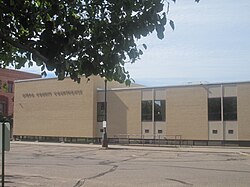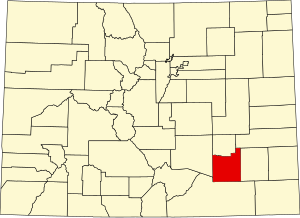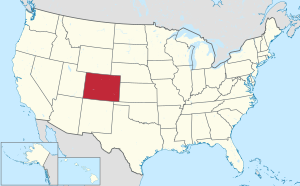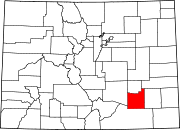Otero County, Colorado
Otero County | |
|---|---|
 Otero County Courthouse in La Junta, Colorado | |
 Location within the U.S. state of Colorado | |
 Colorado's location within the U.S. | |
| Coordinates: 37°54′N 103°43′W / 37.9°N 103.71°W | |
| Country | |
| State | |
| Founded | March 25, 1889 |
| Named for | Miguel Antonio Otero |
| Seat | La Junta |
| Largest city | La Junta |
| Area | |
• Total | 1,270 sq mi (3,300 km2) |
| • Land | 1,262 sq mi (3,270 km2) |
| • Water | 7.7 sq mi (20 km2) 0.6% |
| Population | |
• Estimate (2015) | 18,343 |
| • Density | 15/sq mi (6/km2) |
| Time zone | UTC−7 (Mountain) |
| • Summer (DST) | UTC−6 (MDT) |
| Congressional district | 4th |
| Website | www |


Otero County is one of the 64 counties of the U.S. state of Colorado. As of the 2010 census, the population was 18,831.[1] The county seat is La Junta.[2] The county was named for Miguel Antonio Otero, one of the founders of the town of La Junta and a member of a prominent Hispanic family.
Geography
According to the U.S. Census Bureau, the county has a total area of 1,270 square miles (3,300 km2), of which 1,262 square miles (3,270 km2) is land and 7.7 square miles (20 km2) (0.6%) is water.[3]
Adjacent counties
- Crowley County - north
- Kiowa County - northeast
- Bent County - east
- Las Animas County - south
- Pueblo County - west
National protected areas
Trails and byways
Demographics
| Census | Pop. | Note | %± |
|---|---|---|---|
| 1890 | 4,192 | — | |
| 1900 | 11,522 | 174.9% | |
| 1910 | 20,201 | 75.3% | |
| 1920 | 22,623 | 12.0% | |
| 1930 | 24,390 | 7.8% | |
| 1940 | 23,571 | −3.4% | |
| 1950 | 25,275 | 7.2% | |
| 1960 | 24,128 | −4.5% | |
| 1970 | 23,523 | −2.5% | |
| 1980 | 22,567 | −4.1% | |
| 1990 | 20,185 | −10.6% | |
| 2000 | 20,311 | 0.6% | |
| 2010 | 18,831 | −7.3% | |
| 2015 (est.) | 18,343 | [4] | −2.6% |
| U.S. Decennial Census[5] 1790-1960[6] 1900-1990[7] 1990-2000[8] 2010-2015[1] | |||
As of the census[9] of 2000, there were 20,311 people, 7,920 households, and 5,472 families residing in the county. The population density was 16 people per square mile (6/km²). There were 8,813 housing units at an average density of 7 per square mile (3/km²). The racial makeup of the county was 79.02% White, 0.76% Black or African American, 1.43% Native American, 0.70% Asian, 0.08% Pacific Islander, 15.06% from other races, and 2.96% from two or more races. 37.62% of the population were Hispanic or Latino of any race.
There were 7,920 households out of which 32.20% had children under the age of 18 living with them, 52.70% were married couples living together, 12.00% had a female householder with no husband present, and 30.90% were non-families. 27.80% of all households were made up of individuals and 12.90% had someone living alone who was 65 years of age or older. The average household size was 2.49 and the average family size was 3.04.
In the county the population was spread out with 26.90% under the age of 18, 8.90% from 18 to 24, 24.40% from 25 to 44, 23.40% from 45 to 64, and 16.50% who were 65 years of age or older. The median age was 38 years. For every 100 females there were 95.60 males. For every 100 females age 18 and over, there were 91.50 males.
The median income for a household in the county was $29,738, and the median income for a family was $35,906. Males had a median income of $26,996 versus $21,001 for females. The per capita income for the county was $15,113. About 14.20% of families and 18.80% of the population were below the poverty line, including 25.90% of those under age 18 and 11.80% of those age 65 or over.
Communities
See also
- Index of Colorado-related articles
- G.W. Swink, pioneer county commissioner
- List of counties in Colorado
- National Register of Historic Places listings in Otero County, Colorado
- Outline of Colorado
References
- ^ a b "State & County QuickFacts". United States Census Bureau. Retrieved February 11, 2014.
- ^ "Find a County". National Association of Counties. Retrieved 2011-06-07.
- ^ "US Gazetteer files: 2010, 2000, and 1990". United States Census Bureau. 2011-02-12. Retrieved 2011-04-23.
- ^ "County Totals Dataset: Population, Population Change and Estimated Components of Population Change: April 1, 2010 to July 1, 2015". Retrieved July 2, 2016.
- ^ "U.S. Decennial Census". United States Census Bureau. Retrieved June 10, 2014.
- ^ "Historical Census Browser". University of Virginia Library. Retrieved June 10, 2014.
- ^ "Population of Counties by Decennial Census: 1900 to 1990". United States Census Bureau. Retrieved June 10, 2014.
- ^ "Census 2000 PHC-T-4. Ranking Tables for Counties: 1990 and 2000" (PDF). United States Census Bureau. Retrieved June 10, 2014.
- ^ "American FactFinder". United States Census Bureau. Retrieved 2011-05-14.

